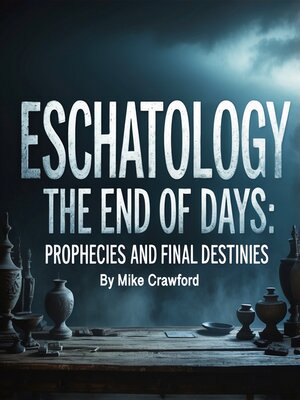Eschatology
audiobook (Unabridged) ∣ The End of Days Prophecies and Final Destinies
By Mike Crawford

Sign up to save your library
With an OverDrive account, you can save your favorite libraries for at-a-glance information about availability. Find out more about OverDrive accounts.
Find this title in Libby, the library reading app by OverDrive.



Search for a digital library with this title
Title found at these libraries:
| Library Name | Distance |
|---|---|
| Loading... |
Eschatological beliefs—theories and narratives about the end of the world—have been central to ancient civilizations across the globe. These cultures developed rich mythologies and religious frameworks to explain how the world would end and what might follow. Although separated by geography and time, these civilizations shared common themes in their end-time beliefs, including moral judgment, cosmic cycles, and the balance between destruction and renewal. These narratives not only reflected their understanding of the cosmos but also served as cautionary tales and moral guidelines for their societies.
In Mesopotamian mythology, one of the earliest known civilizations, eschatological ideas were often tied to divine judgment. The Epic of Gilgamesh, while primarily a story of kingship and the search for immortality, touches on human limitations and the inevitability of death. The Mesopotamians believed that divine forces controlled the fate of humanity, and any deviation from divine order could result in catastrophic punishment. Similarly, the Sumerian Flood Story, which parallels the biblical account of Noah, illustrates how human corruption and disobedience lead to divine retribution through a great flood. The gods, dissatisfied with human noise and disorder, sought to cleanse the earth. This narrative underscores a central belief: the end comes when humanity disrupts cosmic harmony, and survival depends on obedience to divine law.







